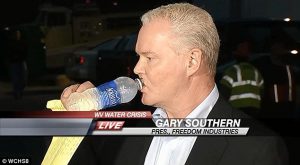
Freedom Industries President Gary Southern faces reporters and the public for the first time after the Jan. 9 chemical spill on the Elk River.
At the gates of Freedom Industries, just a few hundred feet from the shoddy chemical storage tank on the banks of the Elk River that started it all, Gary Southern approached a cluster of microphones. As Freedom Industries’ president, he was about to become the face of a catastrophic chemical spill that threatened the health and well-being of hundreds of thousands West Virginians.
“This incident is extremely unfortunate and unanticipated,” Southern said. “We are very sorry for the disruption.”
But it was too late. For what could be weeks or longer — it was anyone’s guess — 300,000 people would be without safe tap water. Businesses and schools closed. Families waited for reassuring news, but practically every piece of expert advice came with a disclaimer and was of little consolation.
Less than a month later, on Feb. 2, a corroded storm water pipe running under a coal ash pond near Eden, N.C., gave way, spilling an estimated 30,000 to 50,000 tons of toxic coal ash into the Dan River. Inspectors from the N.C. Department of Environment and Natural Resources were sent to the investigate the spill, and Paul Newton, president of Duke Energy’s North Carolina operations, was dispatched to downstream communities with his hat in hand.
“We apologize and will use all available resources to take care of the river,” Newton told impacted residents. “We are accountable.”
Duke Energy CEO Lynn Good called the mayor of Danville, Va., just downstream from the site of the spill, to apologize. And the Associated Press signified how trivial it all can seem with the headline “Polluting N.C. utility says it’s sorry.”
As the cornerstone of crisis P.R., the short-order apology is to be expected. But without action, apologies aren’t meaningful. They aren’t effective cover-ups or remedies, they’re a reflex, a stalling tactic, and a reminder of past offenses.
Before the Dan River spill, for example, Duke Energy had for years accused environmental groups and citizens of crying wolf on the problem of coal ash pollution. So when the Charlotte Business Journal asked readers what grade Duke Energy deserves for its handling of the Dan River coal ash spill, it’s not surprising that 60 percent thought an “F” only fair.
“Apologies can and should be hugely important actions and mechanisms, blessed with enormous power and lasting impact,” Dov Seidman, a consultant focused on corporate values and culture, recently wrote. “But they must be two-way exchanges of trust and healing that are open and transparent.”
According to Seidman, no matter the scale or situation, a few essential criteria must be met for an apology to be authentic: It must be painful. It cannot serve as an excuse or a means to an end. It must force offenders to conduct a “moral audit” of personal and organizational values. And it must embrace ideas as to how to improve.
But perhaps most importantly, to achieve positive change in the wake of environmental disasters that cannot be reversed, an authentic apology must turn true regret into a behavioral shift followed by a continuous investment to avoid repeating past mistakes.
“Bad apologies drive out good,” claims Seidman, “so that those who take their apologies seriously, and work tirelessly to live up to them, are dismissed along with the drivel.”
Not only had Freedom Industries failed to report the spill when it was discovered, it was later revealed the company kept its knowledge of a second chemical a secret. More recently, the disgraced company’s bankruptcy has given new meaning to “conflict of interest,” and Gary Southern stood up the U.S. House Transportation and Infrastructure committee, which invited him to testify on the spill.
So, at least thus far, every indication is that Southern’s apology was one of the bad ones. But it should also be noted that Freedom Industries’ ability to deal with crises was dwarfed by the crisis it created — the company had no emergency response plan, and its initial effort to stop the leak consisted of a cinder block and a 50-pound bag of safety absorbent powder. Now facing dozens of lawsuits, Freedom Industries is momentarily shielded as it goes through bankruptcy.
In North Carolina, Duke Energy has to own up to the reality that it has deserved an “F” on its coal ash report card all along — despite former CEO Jim Rogers’ statement that his company would “ultimately end up cleaning up all that.” The U.S. Attorney’s Office has opened a federal criminal investigation into Duke Energy and officials in the Department of Environment and Natural Resources.
Meanwhile, Duke has begun dredging the Dan River. Some residents that live around Charleston have returned to using their water — others may never trust it. But in the weeks and months ahead, as these spills begin to fade from the media and from the daily conversations in communities surrounding the spills, we should remember all the acceptances of accountability, the promises to do better.
Will the coal industry and companies like Freedom Industries that support it stop pushing for reduced oversight? Will Duke Energy take the necessary steps to protect human and environmental health by moving its coal ash away from North Carolina’s waterways? Only then should we decide whether their apologies are authentic or worth accepting.



Leave a Reply